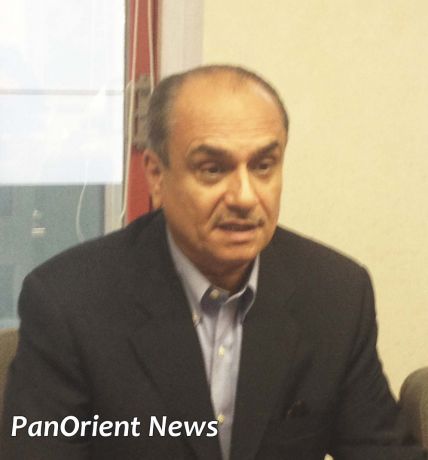|
|
Diplomacy
Palestinian Ambassador to Japan: Pressure Israel to Remove its WMD Arsenal
Tuesday, October 1, 2013

By Mayako Shibata
Tokyo - (PanOrient News) Palestinian ambassador to Japan Mr. Waleed Ali Siam called on the international community to increase pressure on Israel to remove its arsenals of weapons of mass destruction (WMD) along with the current move to eliminate chemical weapons in Syria.
"If the international community is pressuring Syria to destroy all chemical weapons, it should apply that to all the countries in the Middle East including Israel," said Mr. Siam quoting Palestinian Mahmoud Abbas's 4-point proposal given to the UN regarding to the issue of Syria. "In addition to the chemical weapons, we also reiterate that the Middle East should be a nuclear free zone, and all the Middle East countries should apply this policy," Siam said in a lecture organized by the Tokyo-based Middle East Institute. He noted it was up to the UN to figure out 'who' is responsible for the use of chemical weapons in Syria.
Israel reportedly has developed a nuclear arsenal and chemical weapons, all of which are considered a threat to Arab countries. Many calls have argued the right to obtain a deterrence power against Israel.
"Some claims have stated it is necessary for Israel to possess nuclear weapons to survive among 22 Arab countries, but the solution for that is simple. If Israel goes back to the 1967 borders, 57 Arab and Islamic countries, including Iran, stated they would recognize the state of Israel. Then there would be no more need to own nuclear weapons for either Israel or Iran," said Mr. Siam in urging Israel to give up on nuclear weapons to bring stability to the region.
Ambassador Siam said it was surprising to many Arab delegates that Japan did not vote in favor of Israel joining the Non-Proliferation of Nuclear Weapons (NPT) at the IAEA annual general conference held in Vienna on September 20th. The Arab League proposed the resolution criticizing Israel's nuclear arsenal.
Regarding to the issue of Jerusalem, Mr. Siam stated East Jerusalem should be the capitol of a Palestinian state. He denounced Israel's "illegal and illegitimate occupation of the land. But he noted that Jerusalem should be open to all religious people. "Jerusalem should be accessible for all Muslims, Christians, and Jews. Israel says Jerusalem should not be divided. The international community has proposed it should be an international city, and that is one good idea," he said.
In the lecture, attended by Japanese experts on the Middle East issue, Mr. Siam brought up the problem of the Palestinian refugees estimated to be between 5-6 million across the world, but especially in Lebanon and Jordan. He said Israel claims the land of Palestine does not have a capacity to welcome all the refugees when it is established as a state, thus he urged other Arab countries, those hosting Palestinian refugees, to provide them an opportunity to apply for citizenships. He also noted Israel should pay compensation for the refugees who were forcibly removed from their homes alleging they have a right to ask for it.
Palestine and Israel also share a dispute over the use of water resources. Mr. Siam described how Palestinians, especially in the Gaza Strip, suffer from a lack of access to fresh water. "When you turn on a faucet in Gaza, sea water comes out instead of fresh water. Israelis consume most of the water. Some Israelis use enough water for a swimming pool per household whereas Palestinians do not have enough water even to survive," “The water issue is one of the key issues that have to be resolved through negotiations and talks, he said.
Mr. Siam mentioned the current status of Hamas, the Palestinian Sunni Islamic organization which has governed the Gaza Strip since 2007.
Calling the situation in Gaza as 'the worst nightmare,' as a social structure that has been dissipated with lack of protection for civilians, Mr. Siam supported the Egyptian interim government's action of having shut down hundreds of tunnels used for smuggling goods and connecting Egypt and Gaza. Instead, he stated that all the crossings between the two should be re-opened for humanitarian reasons so that fundamental goods can reach the people in Gaza.
In addition, he explained how Hamas is isolated today. "Hamas lost Iran, Syria, Egypt, and the Hezbollah from Lebanon… they have nobody," he said. Hamas seems to have agreed to place their forces on the borders, but Mr. Siam stated he would not believe their words until they actually do it. For the future of the group, Mr.Siam called on them to come back to the Palestine side as long as they could accept reconciliation based on the philosophy of President Abbas, and the principles of the PLO with respect to the Palestinian people's choice.
Concluding his speech, Mr. Siam urged the Japanese government to recognize the state of Palestine. "Although Japan supported the recognition of Palestine as a state at the UN, the country itself has not recognized Palestine as a state," he said.
The Ministry of Foreign Affairs of Japan (MOFA) seems to have explained to the Palestinian authorities that it was due to legal matters. However, Mr. Siam is not convinced. "Israel does not have clear borders, whereas Palestine has based on 1967 borders backed by the UN Security Council resolution. And Kosovo has not been recognized as a state, but Japan recognized it as a country. There would be some challenges for the Japanese government and we Palestinians will really appreciate that, but it is really time for Japan to recognize the state of Palestine," he said.
Peace negotiation talks between Palestine and Israel has been resumed this year after three years. It is scheduled to go on for 9 months.
PanOrient News
© PanOrient News All Rights Reserved.
|
|